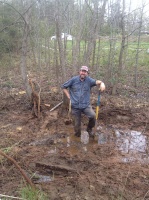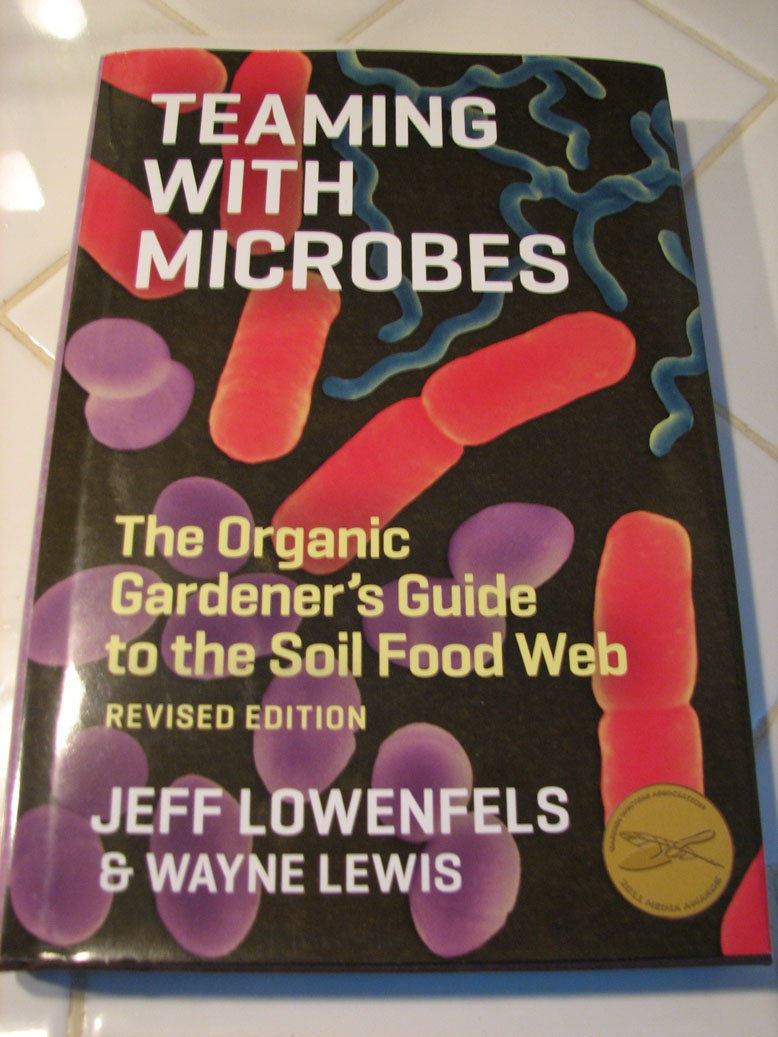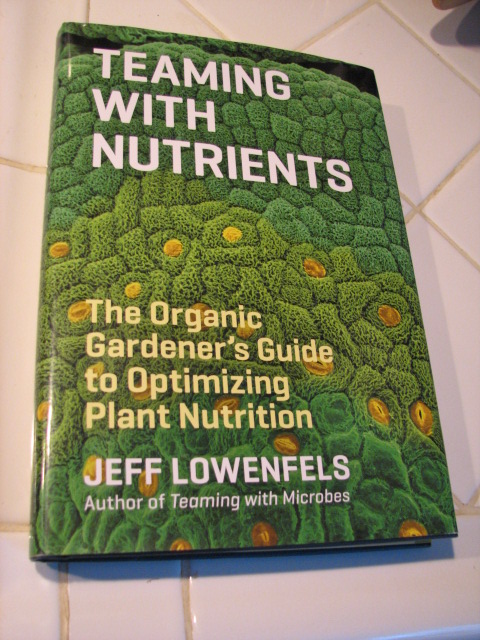Search
Latest topics
» What do I do with tomato plants?by SMEDLEY BUTLER Today at 12:18 am
» What Have You Picked From Your Garden Today
by Guinevere Yesterday at 7:13 pm
» Compost not hot
by Guinevere Yesterday at 7:08 pm
» Cabbage worms
by Guinevere Yesterday at 7:07 pm
» They don't call 'em garden BEDS for nothing.
by sanderson Yesterday at 2:34 am
» N & C Midwest—May 2024
by JAM23 5/11/2024, 5:24 pm
» Ohio Gardener's Greenhouse
by sanderson 5/10/2024, 2:06 pm
» Spring Flowers
by OhioGardener 5/9/2024, 12:02 pm
» Birds of the Garden
by OhioGardener 5/7/2024, 8:26 pm
» Greetings from Southport NC
by sanderson 5/6/2024, 4:36 am
» In the news: Biosolids in Texas.
by sanderson 5/6/2024, 4:19 am
» Rhubarb Rhubarb
by Scorpio Rising 5/5/2024, 7:57 pm
» Complicated mixed up bunny poop!
by jemm 5/5/2024, 7:24 pm
» Mark's first SFG
by markqz 5/4/2024, 12:08 am
» question about the digital tools from the sfg site.
by OhioGardener 5/2/2024, 4:50 pm
» Assistance Needed: Sugar Snap Peas Yellowing and Wilting
by Scorpio Rising 5/1/2024, 8:24 pm
» OMG, GMO from an unexpected place.
by sanderson 5/1/2024, 1:57 am
» N & C Midwest: March and April 2024
by Scorpio Rising 4/29/2024, 1:30 pm
» Lovage, has anyone grown, or used
by OhioGardener 4/29/2024, 12:27 pm
» New to SFG in Arlington, Tx
by sanderson 4/26/2024, 3:13 pm
» Soil Blocks: Tutorial In Photos
by OhioGardener 4/25/2024, 5:20 pm
» Manure tea overwintered outside - is it safe to use?
by Mhpoole 4/24/2024, 7:08 pm
» Advice on my blend
by donnainzone5 4/24/2024, 12:13 pm
» Senseless Banter...
by OhioGardener 4/24/2024, 8:16 am
» Kiwi's SFG Adventure
by sanderson 4/22/2024, 2:07 pm
» Sacrificial Tomatoes
by SMEDLEY BUTLER 4/22/2024, 10:36 am
» From the Admin - 4th EDITION of All New Square Foot Gardening is in Progress
by sanderson 4/21/2024, 5:02 pm
» Happy Birthday!!
by AtlantaMarie 4/21/2024, 6:56 am
» Three Sisters Thursday
by sanderson 4/20/2024, 5:25 pm
» Recommended store bought compost - Photos of composts
by sanderson 4/20/2024, 3:08 pm
Google
Understanding test results and recommendations
+6
camprn
donnainzone5
AtlantaMarie
Scorpio Rising
Zmoore
Bart
10 posters
Page 1 of 1
 Understanding test results and recommendations
Understanding test results and recommendations
Hi Folks,
My two year old Mel's Mix was sent off to be tested. The results were, no lime needed. But, add 10 10 10 fertilizer at a ratio of 2lbs per every 100 square feet. The thing is, I don't want to do that. I would rather use my own compost. But, I have no idea what the chemical content of the compost is. Basically it consists of grass clippings and kitchen scraps at about a 50/50 ratio. Here's the question: how do I determine if the compost will supply the needed nutrients for the garden as the 10 10 10 recommendation suggested?
Thanks
Bart
My two year old Mel's Mix was sent off to be tested. The results were, no lime needed. But, add 10 10 10 fertilizer at a ratio of 2lbs per every 100 square feet. The thing is, I don't want to do that. I would rather use my own compost. But, I have no idea what the chemical content of the compost is. Basically it consists of grass clippings and kitchen scraps at about a 50/50 ratio. Here's the question: how do I determine if the compost will supply the needed nutrients for the garden as the 10 10 10 recommendation suggested?
Thanks
Bart
Last edited by camprn on 3/18/2016, 11:29 am; edited 1 time in total (Reason for editing : expanded title)

Bart- Posts : 129
Join date : 2015-04-17
Location : Troy, VA
 Re: Understanding test results and recommendations
Re: Understanding test results and recommendations
Black Bart (sorry couldn't resist),
I see you're in Virginia which means it's possible you sent your soil samples to VPI (Virginia Tech). Now, I have not done this myself yet, but there is an option on the typical forms you send in for soil testing where you can test for "organic matter". If I recall correctly that's an additional $10. I THINK if you send compost in, check that you want an organic matter test, they'll send you back a report and the report will include a "typical" N-P-K information for you.
I would suggest that as a "start" to finding a solution. However, to be honest I have not done it yet, so I can't first hand tell you that it will provide all the "answers" you need/want. I have some sample boxes at home and plan to send it to VPI in the near future, but I'm in a different situation than you, I'm looking at trying to establish a "base line" for my compost for future use.
I still "suggest" that idea, even though I haven't done it myself yet, AND from what I've gathered so far there has to be some sort of additional "conversion" of chemical to organic to arrive at the final "answer". Example, easy to see in any garden store, chemical fertilizer 10-10-10, o.k. let's go look at organic .5-.5-.5. WHOA!!! it takes 20 times as much organic fertilizer to match chemical? Heck with that, go chemical. Well.... chemical fertilizers disrupt the soil food web and in the "long haul" create salts and generally lower pH... wait, a minute that's not good. Also, generally while chemical fertilizer may say 10-10-10, which is "generally" a ratio of key nutrients by volume, it's soluble, which generally means once water is introduced, it mixes with the water, BUT the plant may not be able to catch all "10" from the water as it passes by and once it mixes with water and passes by.... it's gone. There's kind of an "apples and oranges" thing going on here. Organic fertilizes are generally rated much lower on the N-P-K scale, BUT those nutrients are in a form that are available for plant uptake and don't "wash away" as readily, BUT they take a little longer for "uptake". Chemical fertilizers are are rated much higher, BUT they become almost immediately available with the first introduction of water (see green lawn following first rain after chemical application), BUT the concentration of N-P-K available to plant after first introduction of water exceeds what the plant can take in the first place AND that concentration declines with each "rainfall" over time.
Something so simple can get very complex in a hurry. In summary, for what it's worth, I say continue to go the "organic" route, in the long run I THINK it will work out for you. Try getting your compost tested to start gathering information on what your "base line" compost is. If your like me no two compost piles are the same, BUT you can try to get a "base line". My 2 cents.
P.S. Your "50/50" ratio is all "green" or "N". Your compost should have a great "N" value, BUT I'm surprised you've even gotten it to compost. Well, on the one hand. On the other hand, the main variable for creating compost is time. Stuff rots, no doubt, it will happen, just a matter of time and.... smell? Then again, grass clippings are generally considered "greens", but once they have had enough time to dry out don't they become closer to "straw", which is a "brown" or "C"(carbon)? Again, amazing how something as simple as "rotting" can become so complex.
I see you're in Virginia which means it's possible you sent your soil samples to VPI (Virginia Tech). Now, I have not done this myself yet, but there is an option on the typical forms you send in for soil testing where you can test for "organic matter". If I recall correctly that's an additional $10. I THINK if you send compost in, check that you want an organic matter test, they'll send you back a report and the report will include a "typical" N-P-K information for you.
I would suggest that as a "start" to finding a solution. However, to be honest I have not done it yet, so I can't first hand tell you that it will provide all the "answers" you need/want. I have some sample boxes at home and plan to send it to VPI in the near future, but I'm in a different situation than you, I'm looking at trying to establish a "base line" for my compost for future use.
I still "suggest" that idea, even though I haven't done it myself yet, AND from what I've gathered so far there has to be some sort of additional "conversion" of chemical to organic to arrive at the final "answer". Example, easy to see in any garden store, chemical fertilizer 10-10-10, o.k. let's go look at organic .5-.5-.5. WHOA!!! it takes 20 times as much organic fertilizer to match chemical? Heck with that, go chemical. Well.... chemical fertilizers disrupt the soil food web and in the "long haul" create salts and generally lower pH... wait, a minute that's not good. Also, generally while chemical fertilizer may say 10-10-10, which is "generally" a ratio of key nutrients by volume, it's soluble, which generally means once water is introduced, it mixes with the water, BUT the plant may not be able to catch all "10" from the water as it passes by and once it mixes with water and passes by.... it's gone. There's kind of an "apples and oranges" thing going on here. Organic fertilizes are generally rated much lower on the N-P-K scale, BUT those nutrients are in a form that are available for plant uptake and don't "wash away" as readily, BUT they take a little longer for "uptake". Chemical fertilizers are are rated much higher, BUT they become almost immediately available with the first introduction of water (see green lawn following first rain after chemical application), BUT the concentration of N-P-K available to plant after first introduction of water exceeds what the plant can take in the first place AND that concentration declines with each "rainfall" over time.
Something so simple can get very complex in a hurry. In summary, for what it's worth, I say continue to go the "organic" route, in the long run I THINK it will work out for you. Try getting your compost tested to start gathering information on what your "base line" compost is. If your like me no two compost piles are the same, BUT you can try to get a "base line". My 2 cents.
P.S. Your "50/50" ratio is all "green" or "N". Your compost should have a great "N" value, BUT I'm surprised you've even gotten it to compost. Well, on the one hand. On the other hand, the main variable for creating compost is time. Stuff rots, no doubt, it will happen, just a matter of time and.... smell? Then again, grass clippings are generally considered "greens", but once they have had enough time to dry out don't they become closer to "straw", which is a "brown" or "C"(carbon)? Again, amazing how something as simple as "rotting" can become so complex.

Zmoore-
 Posts : 225
Posts : 225
Join date : 2015-04-14
Location : Virginia Zone 7a
 Re: Understanding test results and recommendations
Re: Understanding test results and recommendations
Bart, I would not do the NPK thing, trust in your compost. Even if you are N heavy, if you use a slow method, it WILL cook down into black gold.
Have you used your compost on your beds at all before?
Honestly, do a side by side...compost on half, chemical on the other....I think organic will win. Plus it is much healthier for everything right down to the little microbes working their single cells off for the betterment of Humanity!
Trust in the compost. Yeah, and make sure you have enough browns, I struggle with that too, it's the bulk. Straw, leaves, shredded cardboard (who does that?). People do...not me. That is the stuff that makes the pile "cook".
Look up stuff in the search box about compost, microbes....I think you should use your compost and learn from your journey! Keep NOTES!
Have you used your compost on your beds at all before?
Honestly, do a side by side...compost on half, chemical on the other....I think organic will win. Plus it is much healthier for everything right down to the little microbes working their single cells off for the betterment of Humanity!
Trust in the compost. Yeah, and make sure you have enough browns, I struggle with that too, it's the bulk. Straw, leaves, shredded cardboard (who does that?). People do...not me. That is the stuff that makes the pile "cook".
Look up stuff in the search box about compost, microbes....I think you should use your compost and learn from your journey! Keep NOTES!


Scorpio Rising-
 Posts : 8731
Posts : 8731
Join date : 2015-06-12
Age : 62
Location : Ada, Ohio
 Re: Understanding test results and recommendations
Re: Understanding test results and recommendations
Straw? As in the stuff used as bedding for horses and other farm animals? Shredded cardboard? What, take a box and cut it into pieces and place in the pile?Trust in the compost. Yeah, and make sure you have enough browns, I struggle with that too, it's the bulk. Straw, leaves, shredded cardboard (who does that?). People do...not me. That is the stuff that makes the pile "cook".
Bart

Bart- Posts : 129
Join date : 2015-04-17
Location : Troy, VA
 Re: Understanding test results and recommendations
Re: Understanding test results and recommendations
Yep. Cardboard is just wood pulp. And, yes, straw, especially from barns, is full of manure, urine, other garden nutrients.
Grass clipping are great. I add them every time I mow my garden area. But you definitely need to add some browns like the cardboard, straw, leaves, etc. Also your veggie/fruit remains, coffee grounds, etc.
Grass clipping are great. I add them every time I mow my garden area. But you definitely need to add some browns like the cardboard, straw, leaves, etc. Also your veggie/fruit remains, coffee grounds, etc.
 Re: Understanding test results and recommendations
Re: Understanding test results and recommendations
Bart,
I was also mystified (at first) about using cardboard in the compost. However, I read that you can soak it in water, after which time it's easy to tear into small pieces. I like to use the cardboard centers from toilet paper and paper towel rolls.
I was also mystified (at first) about using cardboard in the compost. However, I read that you can soak it in water, after which time it's easy to tear into small pieces. I like to use the cardboard centers from toilet paper and paper towel rolls.
 Re: Understanding test results and recommendations
Re: Understanding test results and recommendations
I am curious about the actual results. Sent from the lab. But seeing that the recomendation of 10-10-10 tells me your mix is dpleted of nutrients overall. Just fill up the box with your compost and turn it under. The plants will indicate what they need as they grow.
43 years a gardener and going strong with SFG.
https://squarefoot.forumotion.com/t3574-the-end-of-july-7-weeks-until-frost
There are certain pursuits which, if not wholly poetic and true, do at least suggest a nobler and finer relation to nature than we know. The keeping of bees, for instance. ~ Henry David Thoreau
https://squarefoot.forumotion.com/t1306-other-gardening-books
 Re: Understanding test results and recommendations
Re: Understanding test results and recommendations
I stick an open box on top of my pile and fill it with my daily compost contributions. Over time eventually gets buried and disappears.

I also use shredded office paper.
I wouldn't use fertilizer in my MM unless the plants tell me to.
CC
I also use shredded office paper.
I wouldn't use fertilizer in my MM unless the plants tell me to.
CC

CapeCoddess- Posts : 6824
Join date : 2012-05-20
Age : 68
Location : elbow of the Cape, MA, Zone 6b/7a
 Re: Understanding test results and recommendations
Re: Understanding test results and recommendations
Bart, When I read your post yesterday, I was short on time to respond. I'm wondering if you have had some indication that the Mel's Mix was lacking in nutrients for you to have it tested. I agree with Camprn that it sounds like the nutrients are becoming depleted. Have you been topping off the boxes up to the original MM heights? Or, has it shrunk over the 2 years because you haven't been adding enough quality compost to keep it to the original height? It will shrink over time as the microorganisms break it down (which in turn feeds the plants.
When you first made the Mel's Mix, did you use 5 different sources of compost? If so, that blended compost is what you should still be using. Likewise, if you make your own compost, you should try to have as many different ingredients as possible, including a barnyard manure. I notice that you are relatively close to the Atlantic Ocean so seaweed/kelp can also be an ingredient.
I would stay away from the 10-10-10 type of fertilizer (fast release) and go with the lower numbered organic feedings (slow release). The microorganisms and worms and such in the soil (good critters) can really be harmed with fast release fertilizers. I use the word "organic" in the sense that the ingredients come from living or once-living plant or animal sources. Reading off a bag of Espoma Organic Garden-tone: Feathers, manure, bone meal, alfalfa . . .
I like the below calculator when I build a compost pile. Just play around with it and you will see how much "browns", such as leaves or straw, to use with the 'greens", such as manure, kitchen waste, fresh lawn clippings, etc.
http://klickitatcounty.org/SolidWaste/fileshtml/organics/compostCalc.htm
When you first made the Mel's Mix, did you use 5 different sources of compost? If so, that blended compost is what you should still be using. Likewise, if you make your own compost, you should try to have as many different ingredients as possible, including a barnyard manure. I notice that you are relatively close to the Atlantic Ocean so seaweed/kelp can also be an ingredient.
I would stay away from the 10-10-10 type of fertilizer (fast release) and go with the lower numbered organic feedings (slow release). The microorganisms and worms and such in the soil (good critters) can really be harmed with fast release fertilizers. I use the word "organic" in the sense that the ingredients come from living or once-living plant or animal sources. Reading off a bag of Espoma Organic Garden-tone: Feathers, manure, bone meal, alfalfa . . .
I like the below calculator when I build a compost pile. Just play around with it and you will see how much "browns", such as leaves or straw, to use with the 'greens", such as manure, kitchen waste, fresh lawn clippings, etc.
http://klickitatcounty.org/SolidWaste/fileshtml/organics/compostCalc.htm
 Re: Understanding test results and recommendations
Re: Understanding test results and recommendations
Bart, for what its worth, several years ago our county received a grant to offer free soil testing. I happened to mention to an extension agent and master gardener that I was going to send in my Mel's Mix for testing. They recommended against that because only containing compost, vermiculite, and peat, the tests don't come back accurate...the test they use is accurate for real soil.
Basically they said that compost is rich and really good for gardening, but the test results will tell you that you need to add fertilizer which may not be needed.
Basically they said that compost is rich and really good for gardening, but the test results will tell you that you need to add fertilizer which may not be needed.

landarch- Posts : 1152
Join date : 2012-01-22
Location : kansas city
 Re: Understanding test results and recommendations
Re: Understanding test results and recommendations
UMass soil lab offers a test for soilless growing mediums (Mel's mix) that contain no 'soil'.landarch wrote:Bart, for what its worth, several years ago our county received a grant to offer free soil testing. I happened to mention to an extension agent and master gardener that I was going to send in my Mel's Mix for testing. They recommended against that because only containing compost, vermiculite, and peat, the tests don't come back accurate...the test they use is accurate for real soil.
Basically they said that compost is rich and really good for gardening, but the test results will tell you that you need to add fertilizer which may not be needed.
43 years a gardener and going strong with SFG.
https://squarefoot.forumotion.com/t3574-the-end-of-july-7-weeks-until-frost
There are certain pursuits which, if not wholly poetic and true, do at least suggest a nobler and finer relation to nature than we know. The keeping of bees, for instance. ~ Henry David Thoreau
https://squarefoot.forumotion.com/t1306-other-gardening-books
 Re: Understanding test results and recommendations
Re: Understanding test results and recommendations
Hi BartBart wrote:Hi Folks,
My two year old Mel's Mix was sent off to be tested. The results were, no lime needed. But, add 10 10 10 fertilizer at a ratio of 2lbs per every 100 square feet. The thing is, I don't want to do that. I would rather use my own compost. But, I have no idea what the chemical content of the compost is. Basically it consists of grass clippings and kitchen scraps at about a 50/50 ratio. Here's the question: how do I determine if the compost will supply the needed nutrients for the garden as the 10 10 10 recommendation suggested?
Thanks
Bart
The only thing you need to add are these 2 books to get you accustomed to using compost. They will clear it up and pay special interest in the compost tea section.



jimmy cee
Certified SFG Instructor-
 Posts : 2215
Posts : 2215
Join date : 2013-02-16
Age : 88
Location : Hatfield PA. zone 6b
 Re: Understanding test results and recommendations
Re: Understanding test results and recommendations
Jimmy introduced us to the book this winter. Very good.
 Similar topics
Similar topics» Soil test results
» Soil test results..
» soil testing
» surprising results from soil test
» Potting Mix Recommendations.
» Soil test results..
» soil testing
» surprising results from soil test
» Potting Mix Recommendations.
Page 1 of 1
Permissions in this forum:
You cannot reply to topics in this forum









